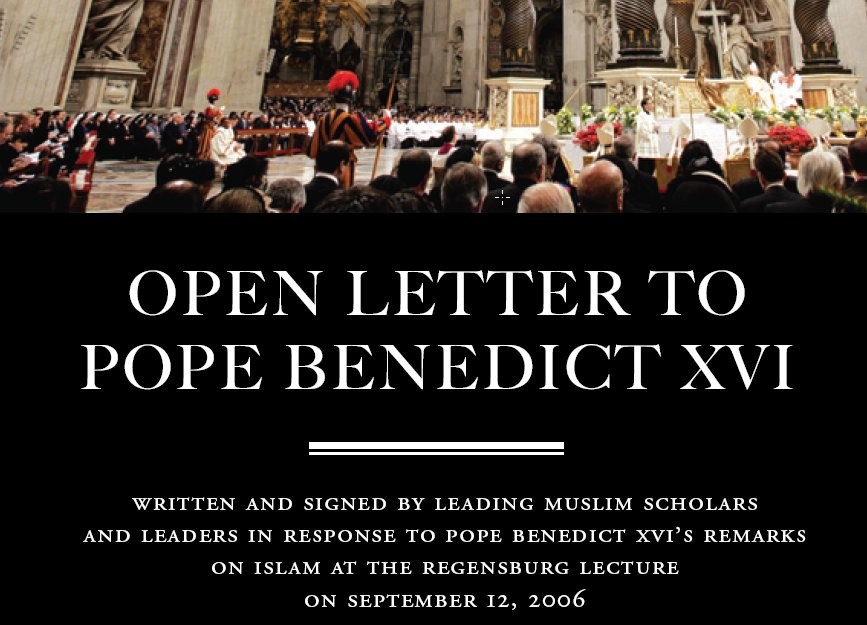|
Letter from Muslim leaders to the Pope
Good relationships and better mutual understandings between different faiths are to be encouraged. However when does interfaith discussions cross over to become multi-faith syncretism?
(first published 18/09/08)
MORE than 130 Muslim scholars have written to Pope Benedict and other Christian leaders urging greater understanding between the two faiths.
They say that world peace could depend on improved relations between Muslims and Christians.
The letter, which is a response to a lecture given by the Pope in which he criticised Islam, identifies similarities in both religions, such as the requirements to accept only one god and live in peace with one's neighbours.
It is headed:
In the Name of God, the Compassionate, the Merciful,
And may Peace and Blessings be upon the Prophet Muhammad
In effect, there are huge tensions within the Islamic world (particularly since 9/11 and events following) and this letter is a statement by "moderates" who would want to distance themselves from acts of terrorism carried out by Al Queda et al.
A big problem for the Islamic community - and anyone seeking to interpret that faith - is that the Koran is written over two distinct period; the earliest when the writer was in a minority position (and the teachings were and are submissive and reconciliatory), and the second period when a new dominance allowed for a much more aggressive stance. So depending on which section of the Koran is being quoted it is very easy to find verses which teach either harmony and peace, or alternatively, highly threatening attitudes.
Another major difficulty for Islamic leaders is that there is neither a centralised structure nor a single representative that can claim to speak for Islam. Virtually anyone who has the charisma and influence to attract a following can set himself up as an Imam (prayer leader in a mosque).
Added to all of this is the historic and bloody rivalry between the Shia and Sunni sects (witnessed in the 1980 - 1988 war between Iran and Iraq).
As we know, true peace and ultimate peace, can only be found in and delivered by the Prince of Peace who is in the line of Abraham and Isaac (and Jacob) - not Ishmael.
Some say that many Muslims carry a spirit of "fatherlessness" (children of Hagar); and that what they seek is a "father" God.
To read a full copy of this letter, click on the image below.

Addendum (update):
Subsequent to the above one year later, in September 2007, 138 Islamic scholars called for reconciliation and peace by way of another open letter entitled A Common Word Between Us and You. It was published on the internet and was designed as an open greeting "addressed to the leaders of all the world’s churches, and indeed to all Christians everywhere."
Now (Autumn 2008) an Israel-based leader has responded by pointing out the irreconcillable differences between Islam and Christianity.
Marcel Rebiai was born 1953 in Algeria, raised strictly Moslem but as a young man came to know Jesus as his Saviour. He is now Director of the Community of Reconciliation (COR) and has living in Israel since 1994 with his wife and four children. With an international teaching ministry, he is well acquainted with the world of Islam, as well as with the conditions of the body of Christ in Israel and the Western world. His article is well worth reading. In it the author states:
Jesus is the only truth about the father, making all other confessions of faith meaningless. As the door to life, Jesus makes all other doors lead to dead ends. Jesus is the only source of life which God has given to man. For Islam (and for every other religion) this is a stumbling block, an unreasonable claim and an insult. From the gospel's standpoint there is no leeway.
Rebiai is the author of Islam, Israel and the Church. |
|
|
|